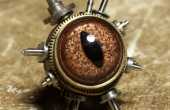Lauren Brooks
Lauren is a freelance writer with a longstanding interest in horror film, British TV and steampunk literature. She holds two Masters in Film and Creative Writing.
Contributor I
- Plebian Penman
- Lurker
- Pssst
- ?
- Articles
3 - Featured
3 - Comments
19
- Ext. Comments
12 - Processed
0 - Revisions
0
- Topics
0 - Topics Taken
0 - Notes
0
- Topics Proc.
0 - Topics Rev.
0
- Points
649 - Rank
X - Score
283
Latest Articles
Latest Comments
| The Future of Film in a Post-Genre World | |
My one problem with what you present is the concept that 1) academic work must be tailored to a popular market, which changes like the tides and is often populated with people unwilling to engage in intellectual discourse and 2) that academic writing is made up of needless jargon. It isn’t, and what you’re essentially proposing here seems to be a dumbing down of academic discourse because others can’t be bothered to learn what cultural hegemony is. That’s not the way to advance intellectual development, or to make film studies respected as more than simply people watching movies. Bordwell is one of the more popular and less-interesting film writers working today, mostly because he’s parroting what smarter writers have done before. He might have an engaging style, but that does not mean he has an engaging intellect. | Film Studies For Free: A Model for the Future |
Nosferatu was actually based on the novel; it was just an unauthorized adaptation. They changed the names, but Stoker’s widow tried to sue the studio and have the entire film suppressed and all prints destroyed. It follows the plot of the novel just as much as, say, the 1931 Dracula, or the 1979 Dracula, or the Horror of Dracula. White Zombie isn’t a vampire movie; it’s trading on the recognition of the Lugosi as Dracula, yes, but it has nothing to do with the character. | A Dracula Retrospective: From Devil Incarnate To Tragic Lover |
Thanks. I’m pleased that you found it interesting. Nosferatu is a disturbing film when considered from the perspective of race, and the equation of vampirism with plague or pestilence. That does come into the novel, though, – the concept of ‘invasion from the East’. | A Dracula Retrospective: From Devil Incarnate To Tragic Lover |
Why don’t you consider it a Dracula adaptation? It would even have used the same names were it not for the lawsuit by Stoker’s widow. | A Dracula Retrospective: From Devil Incarnate To Tragic Lover |
I agree with the others: it can indeed appear dated and even dull/bizarre at times, but the 1931 Dracula is perhaps the most iconic Dracula film ever, and immensely important both in the history of horror movies and the history of vampires on screen. Lugosi’s performance stands out. I disagree about Tod Browning being a poor director. While I wouldn’t consider this his greatest film (I suppose you have to go with Freaks or one of his silents with Lon Chaney), it is a fascinating work. | A Dracula Retrospective: From Devil Incarnate To Tragic Lover |
I think we do need to be wary of the amount of influence fans themselves can have on media culture. Comic-Con has become massively influential not just in how a film or show is perceived, but what films and shows even get the go-ahead. I’m convinced that the increase in superhero films is related to the rising power of the fan and conventions like SDCC. But you can only go so far in fandoms without it becoming repetitious. Films are becoming more like fan services and less like actual films for the broader public. | The New Era of Fandom |
I’ve seen this pop up on Twitter and Tumblr a lot recently but never really paid much attention. Now you had me at ‘comparison to H.P. Lovecraft.’ | 10 Reasons to Listen to Welcome to Night Vale |



I was going to say: I’m a bit confused as to the argument you’re making here. It seems that all these filmmakers take a particular genre and bend it to their will, mixing in other elements from other genres. The Coens are a good example of this – they defy convention, but not genre.